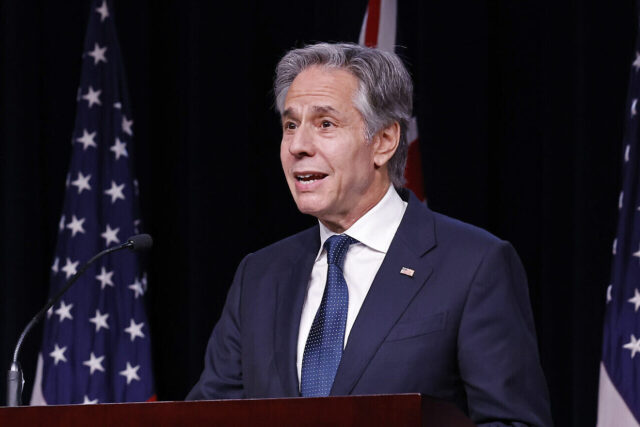The most prevalent rumor regarding a possible Iranian attack on Israel was that Iran would strike over Tisha B’Av, Judaism’s somber commemoration of the loss of the Jewish Temples in Jerusalem in 586 BCE and 70 C.E. (makes you wonder who the “colonizers” are, doesn’t it?), as well as other difficult moments in Jewish history.
A lot of people opined that the mullahs’ government would see the irony of adding to Jewish mourning, but there would also be irony in the fact that Tehran considered the Jewish link to Jerusalem to be of interest.
In any case, the attack didn’t happen.
The Biden administration had ramped up the American military presence in the region and engaged in what National Security Communications Advisor Adm. John Kirby called intense diplomacy.
“We don’t want to see an escalation,” he said, skipping over the fact that Iran calls the additional Western military capability near its borders an “escalation.” Kirby continued: “If there is one, my goodness, we’re going to be ready to defend Israel and defend ourselves as appropriate.”
Department of Defense Press Secretary Maj. Gen. Pat Ryder added: “We’re trying to send a message, which is we’re looking to de-escalate the situation” and “protect our forces while also supporting the defense of Israel.”
OK, fine—good, even—that the U.S. is prepared to defend Israel in case of an Iranian direct attack. But Iran has openly rejected European and American calls for “de-escalation.”
What if Tehran neither escalates nor de-escalates, but goes on with the status quo for itself and its proxy Hezbollah, stretching Western military capabilities and patience? Will the U.S. demand concessions from Israel to prevent “further escalation”?
Even if Washington doesn’t, between 80,000 to 100,000 Israelis are presently displaced from their homes and a lot of Lebanese are trying to flee their country. Northern Israel is on long-term, high-level alert. How long does the U.S. expect Israel to live with this without responding?
Would responding be considered “escalation” after we called for “de-escalation”?
And what if there is a drop in the number of rockets and missiles Hezbollah fires at Israel and Iran agrees not to test its own missiles? Right now? For how long? Is Israel required to let its threat status drop? How much for how long? Will Israel be encouraged to make a corresponding show of good faith? How big a show?
Hold those questions.
After Israel observed the Tisha B’Av fast, Secretary of State Antony Blinken embarked on a regional visit designed to, according to Axios, “prevent a wider regional war.” In the State Department readout of a phone call between Blinken and a Turkish official, Blinken’s goal is to “finalize the framework for achieving an immediate ceasefire in Gaza, securing the release of all hostages, and ending the war.” Blinken’s visit will take him to Qatar, Egypt and Israel, but Axios, stating the obvious, notes that the trip could be postponed if Iran attacks.
Even recognizing that Qatar is the international negotiating face of Iran, Blinken’s visit appears limited to the issue of Israel and Hamas in Gaza, where he appears to think an “end to the war” is possible.
Is that the same war Kirby is trying to keep from escalating? These are American ships passing each other in the night, failing to see the shore or each other. Try to merge the armada.
Perhaps Iran would “de-escalate” if there was an acceptable ceasefire in Gaza. Perhaps it would call off Hezbollah, which announced on Oct. 8 that it was firing on Israel in solidarity with Hamas. It may not matter, as Hamas chief tunnel rat Yahya Sinwar has announced that his organization will not take part in ceasefire talks. This is a coordinated maneuver.
This is the “broader regional war” Blinken fears. Raising and lowering the threat level is an Iranian battle tactic used by its proxies, including the Houthi naval war and Iranian-controlled forces attacking American soldiers at bases in Iraq.
The best Washington can do vis-à-vis Iran is to make the government in Tehran reconsider the timing of its attacks on American or Israeli assets. There is no leverage the United States has found that influences Hamas’s decision to retain the hostages—both Israeli hostages and Palestinian human sacrifices—because Hamas is not an independent player.
A tactical lowering of the temperature by Iran and/or Hezbollah might happen. Israel might find Sinwar and the hostages. But under no circumstance that doesn’t include the removal of the mullah regime from Tehran will a resolution of the Iranian regional war against both the Little Satan (Israel) and the Big Satan (America) be on the table.
“De-escalation,” then, is a fraud.


